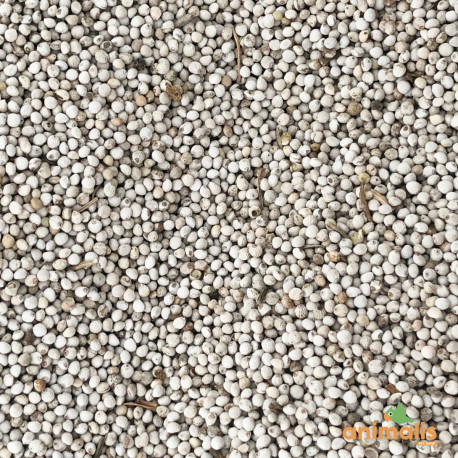- New
- In the process of being restocked




Reference: 103057150
Niger, bird seeds rich in phosphorus and calcium. Niger seeds (or nyjer seeds) are fine seeds rich in oil. They come from Guizotia abyssinica (also called Oleiferous Guizotia). Niger is very popular with most birds, goldfinches and tarins love it.
Niger is one of the few bird seeds with a good calcium/phosphorus ratio.
Rowan berry in dried fruit form, which hooked beaks, native birds, and tropical birds are fond of. Use it to enrich your seed mixes or as treats. Dried fruits have a very long shelf life. Use them daily and in every season for a balanced diet to avoid deficiencies.
The canary seed is a grass, an annual plant up to 1m tall, the seeds being found in the inflorescences. These seeds make up a significant fraction of the majority of bird mixes.
• Excellent for canaries, European and exotic birds, wavy parakeets and large parakeets.
Millet contains magnesium, phosphorus, iron, potassium, manganese, vitamin A, vitamin B1, vitamin B2, vitamin PP (nicotinic acid) and vitamin B5.
Dimensions: 20kg
Cardi seed is rich in protein and linoleic acid, which helps lower cholesterol levels and therefore reduce heart disease. It is found in parakeet and parrot mixes but also in native birds such as bullfinches.
Cardi seeds are high in fat. The amino acid proportions of the seed are very favourable, the arginine content is very high. The seed is low in lysine and methionine + cystine, while tryptophan is completely lacking.
High-quality seeds with a high fat content.
- With a high content of vitamin E, B9, B5, B6, B1, B2, B3, and vitamin K.
- It has antioxidant properties.
- Excellent energy contribution.
- Rich in calcium, potassium, magnesium, phosphorus, proteins, zinc, thiamine, pectin (cleanses the body).
Chenopodium quinoa is an annual plant, one to two meters tall or more. The central stem is cylindrical at the collar and becomes more angular higher. It can be unique or have many ramifications, with a diameter ranging from one to eight centimeters and a height of 0.5 to 3 m, depending on the varieties and growing conditions such as seeding density or fertilization9. Its color is also very variable: uniformly green, green with purple or red streaks, or uniformly red.
Oatmeal or peeled oats are used in the composition of the basic mixtures of canaries and hooked beaks especially during the breeding and feeding period.
Its protein level is quite low, but it is a seed rich in energy.
Crude protein: 13%
Fat: 8%
Carbohydrates: 68%
Phosphorus: 0.4%
Calcium: 0.09%
These seeds rich in lipids and proteins are especially appreciated by wild birds. They will attract sizerins, reeds, goldfinches, black-headed chickadees, sparrows, sad doves and a host of other birds to your garden. It is often used as a replacement for the more expensive shuttle.
Dari, also known as sorghum or millet, is a variety of grain that is related to millet varieties. Dari is the size of a hemp seed. The grain originates from the warm regions of Australia, Asia, Africa, and South America. There are three varieties: white dari, yellow dari, and reddish-brown dari. It is noteworthy that more value is attributed to light dari than to reddish-brown dari. Regarding nutritional value, there is not the slightest difference. Furthermore, reddish-brown dari is well appreciated by lovebirds. Dari can be compared to wheat in terms of starch content. The seed has a favourable composition of amino acids. The protein present in dari has a particularly high leucine content.
Spinach seeds contain vitamins A, B1, B2, B3, B7, B9 and C, mineral salts and trace elements. Regular consumption helps to strengthen the feathers.

